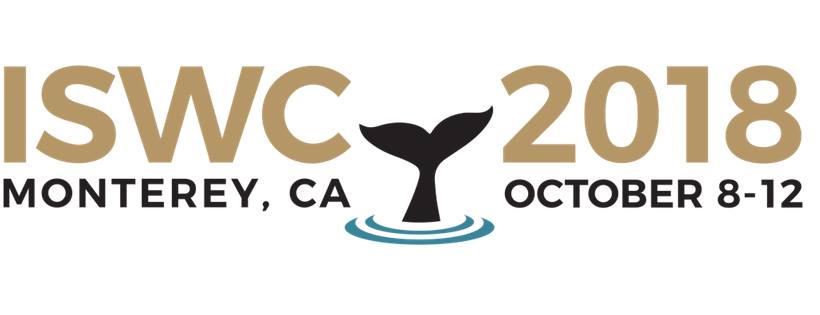 We are very pleased to announce that our group got 4 demo/poster papers accepted for presentation at ISWC 2018 : The 17th International Semantic Web Conference, which will be held on October 8 – 12, 2018 in Monterey, California, USA.
We are very pleased to announce that our group got 4 demo/poster papers accepted for presentation at ISWC 2018 : The 17th International Semantic Web Conference, which will be held on October 8 – 12, 2018 in Monterey, California, USA.
The International Semantic Web Conference (ISWC) is the premier international forum where Semantic Web / Linked Data researchers, practitioners, and industry specialists come together to discuss, advance, and shape the future of semantic technologies on the web, within enterprises and in the context of the public institution.
Here is the list of the accepted papers with their abstract:
- “STATisfy Me: What are my Stats?” by Gezim Sejdiu, Ivan Ermilov, Mohamed Nadjib Mami and Jens Lehmann
Abstract: The increasing adoption of the Linked Data format, RDF, over the last two decades has brought new opportunities.
It has also raised new challenges though, especially when it comes to managing and processing large amounts of RDF data. In particular, assessing the internal structure of a data set is important, since it enables users to understand the data better. One prominent way of assessment is computing statistics about the instances and schema of a data set. However, computing statistics of large RDF data is computationally expensive.
To overcome this challenging situation, we previously built DistLODStats, a framework for parallel calculation of 32 statistical criteria over large RDF datasets, based on Apache Spark. Running DistLODStats is, thus, done via submitting jobs to a Spark cluster. Often times, this process is done manually, either by connecting to the cluster machine or via a dedicated resource manager. This approach is inconvenient as it requires acquiring new software skills as well as the direct interaction of users with the cluster.
In order to make the use of DistLODStats easier, we propose in this paper an approach for triggering RDF statistics calculation remotely simply using HTTP requests. DistLODStats is built as a plugin into the larger SANSA Framework and makes use of Apache Livy, a novel lightweight solution for interacting with Spark cluster via a REST Interface.
- “Joint Entity and Relation Linking using EARL” by Debayan Banerjee, Mohnish Dubey, Debanjan Chaudhuri and Jens Lehmann
Abstract: In order to answer natural language questions over knowledge graphs,most processing pipelines involve entity and relation linking. Traditionally, entity linking and relation linking have been performed either as dependent sequential tasks or independent parallel tasks. In this demo paper, we present EARL, which performs entity linking and relation linking as a joint single task. The system determines the best semantic connection between all keywords of the question by referring to the knowledge graph. This is achieved by exploiting the connection density between entity candidates and relation candidates. EARL uses bloom filters for faster retrieval of connection density and uses an extended label vocabulary for higher recall to improve the overall accuracy
- “Generating SPARQL Query Containment Benchmarks using the SQCFramework” by Muhammad Saleem , Qaiser Mehmood, Claus Stadler, Jens Lehmann and Axel-Cyrille Ngonga Ngomo
Abstract: In this demo paper, we present the interface of the SQCFramework, a SPARQL query containment benchmark generation framework. SQCFramework is able to generate customized SPARQL containment benchmarks from real SPARQL query logs. To this end, the framework makes use of different clustering techniques. It is flexible enough to generate benchmarks of varying sizes and complexities according to user-defined criteria on important SPARQL features for query containment benchmarking. We evaluate the usability of the interface by using the standard system usability scale questionnaire. Our overall usability score of 82.33 suggests that the online interface is consistent, easy to use, and the various functions of the system are well integrated.
- “Synthesizing a Knowledge Graph of Data Scientist Job Offers with MINTE+” by Mikhail Galkin, Diego Collarana, Mayesha Tasnim and Maria-Esther Vidal
Abstract: Data Scientist is one of the most sought-after jobs of this decade. In order to analyze the job market in this domain, interested institutions have to integrate numerous job advertising coming from heterogeneous Web sources e.g., job portals, company websites, professional community platforms such as StackOverflow, GitHub, etc. In this demo, we show the application of the RDF Molecule-Based Integration Framework MINTE+ in the domain-specific application of job market analysis. The use of RDF molecules for knowledge representation is a core element of the framework gives MINTE+ enough flexibility to integrate job advertising from different web resources and countries. Attendees will observe how exploration and analysis of the data science job market in Europe can be facilitated by synthesizing at query time a consolidated knowledge graph of job advertising. The demo is available at: https://github.com/RDF-Molecules/MINTE/blob/master/README.md#live-demo
Acknowledgment
This work has received funding from the EU Horizon 2020 projects BigDataEurope (GA 644564) and QROWD (GA no. 723088), the Marie Skłodowska-Curie action WDAqua(GA No 642795), and HOBBIT (GA. 688227), and (project SlideWiki, grant no. 688095), and the German Ministry of Education and Research (BMBF) in the context of the projects LiDaKrA (Linked-Data-basierte Kriminalanalyse, grant no. 13N13627) and InDaSpacePlus (grant no. 01IS17031).
Looking forward to seeing you at The ISWC 2018.

